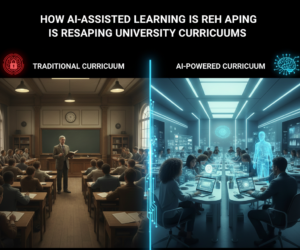In the field of higher education, micro-credentials and short courses are becoming more popular.

In the field of higher education, micro-credentials and short courses are becoming more popular.
Commitments that are made for the long term, such as degree programs that require many years of study, high tuition expenses, and strict academic procedures, have historically been used to describe higher education. However, micro-credentials and short courses have emerged as a new trend in recent years, and this trend is transforming the way that individuals study and prepare themselves for entering the job. These bite-sized, flexible programs are becoming more popular at institutions and online platforms, providing students and professionals with a means of swiftly improving their skills without having to commit to pursuing a full degree. Micro-credentials are becoming an increasingly important component of higher education as the job market continues to evolve and place more emphasis on abilities.
1. What exactly are microcredentials?
Micro-credentials are certificates that are awarded after the completion of brief, focused learning activities. They specialize in the development of certain skills or competences, such as data analysis, digital marketing, leadership training, or project management. They are meant to be finished in weeks or months rather than years, which is different from conventional degrees.
2. The Reason That Short Courses Are Becoming More and More Popular
Traditional curricula are unable to keep up with the rapid pace at which the contemporary workforce is evolving. For those who are looking for a means to quickly and practically address skill shortages and remain relevant in sectors that are being disrupted by technology, automation, and global competition, short courses are an excellent option.
3. Adaptability for Today’s Students
Micro-credentials are very adaptable to different situations. Self-paced, online, and hybrid formats are among the many ways that they are given, making them available to working professionals, parents, and students who do not follow conventional learning paths and may not have the time to pursue a complete degree.
4. A More Economical Alternative to Earning a Degree
Higher education has become more difficult to attain for a large number of people as a result of the increasing expense of tuition. Students are able to get micro-credentials without collecting significant amounts of debt since they are often inexpensive.
5. Concentrated on Employment and Relevant to the Industry
Micro-credential programs are often developed by universities in cooperation with businesses in order to ensure that the programs meet the requirements of the actual world. This guarantees that students acquire the abilities that businesses are actively searching for, which will help to close the gap between academic institutions and the workplace.
6. Pathways to learning that may be stacked on top of one another
The fact that micro-credentials may be “stacked” is one of its advantages. Students are able to get higher credentials, such as diplomas or even degrees, by taking many short courses that may be combined to develop toward bigger qualifications. This provides students with both flexibility and long-term value.
7. Ongoing Professional Development for Professionals
Professionals are required to constantly upgrade their skills in a variety of sectors, particularly in the technology and healthcare industries. Microcredentials provide an organized method of remaining up-to-date on the latest information without disrupting one’s job, which makes lifelong learning more convenient.
8. Making Education Accessible to Everyone
The obstacles that prevent people from accessing education are reduced by short courses. Individuals from a wide range of backgrounds, including those who are unable to dedicate themselves to full-time education, are given the opportunity to acquire significant certificates and enhance their chances for employment in the future.
9. Acknowledgement by Employers
Micro-credentials are being acknowledged by employers more and more as proof of specific knowledge and skills. They may not serve as substitutes for formal education, but they do demonstrate ambition, flexibility, and a dedication to professional development.
10. Providing Support for Career Transitions
Micro-credentials provide a realistic entrance point for those who are interested in changing their professions. Learners have the option of transitioning to developing sectors without having to start over in a typical degree program if they acquire new skills in fields such as digital design, coding, or cybersecurity.
11. Integration with the University’s Academic Programs
Micro-credentials are being included into the curricula of many colleges alongside regular degrees, which in many cases gives students the opportunity to acquire badges, certificates, or credits that may subsequently be used toward obtaining bigger qualifications. The use of this hybrid method makes higher education more relevant in the context of an employment market that is always evolving.
12. Opportunities for International and Cross-Border Collaboration
Learners are able to access many of the short courses that are available since they are provided online and may be accessed from anywhere in the globe. The global reach of education increases the number of options available for learning and links students with worldwide ideas and networks.
13. The Functions of Digital Badges and Online Portfolios
These days, it is common practice to make use of digital badges and certificates to highlight micro-credentials on LinkedIn, on résumés, or in professional portfolios. They increase one’s chances of being hired in a work market that is very competitive by providing verifiable evidence of talents.
14. Obstacles and Prospective Developments
Micro-credentials are beneficial in a variety of ways, but they also face a number of obstacles. One of these is that they are not consistently recognized across different sectors. Another is that there are issues regarding their long-term usefulness in comparison to regular degrees. Nevertheless, as the economy grows more and more dependent on skills in the future, it is anticipated that micro-credentials will play an increasingly important part in the development of higher education.
The emergence of micro-credentials and short courses indicates a change in the landscape of higher education that is trending toward a more flexible, practical, and inclusive paradigm. Learners are given the ability to adjust to the continuously evolving labor market, employers are able to locate individuals who possess the necessary abilities, and institutions are able to maintain their relevance in a period in which lifelong learning is seen as a critical component of success. Although micro-credentials are not going to be able to completely replace conventional degrees, they are increasingly becoming an essential supplement. This is because they are changing the way that information is communicated, acknowledged, and used in the real world.




